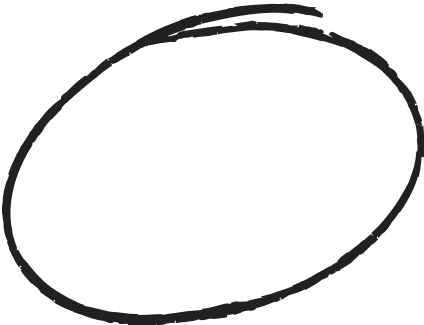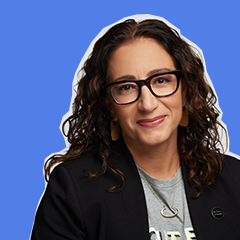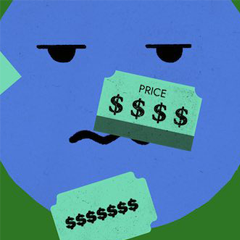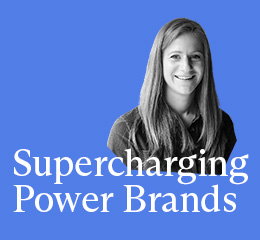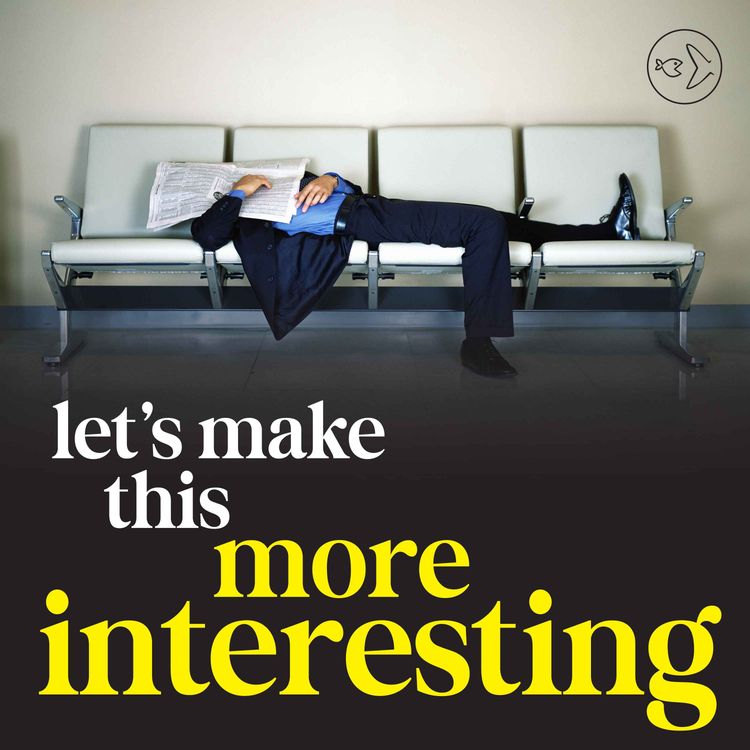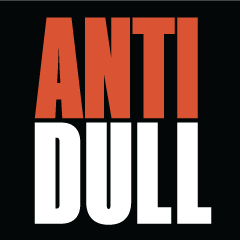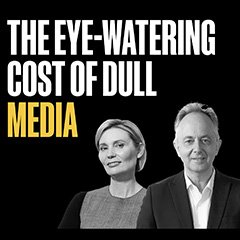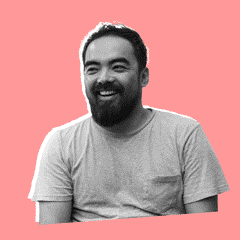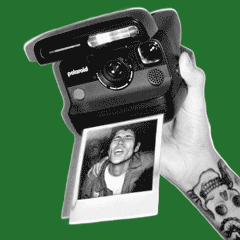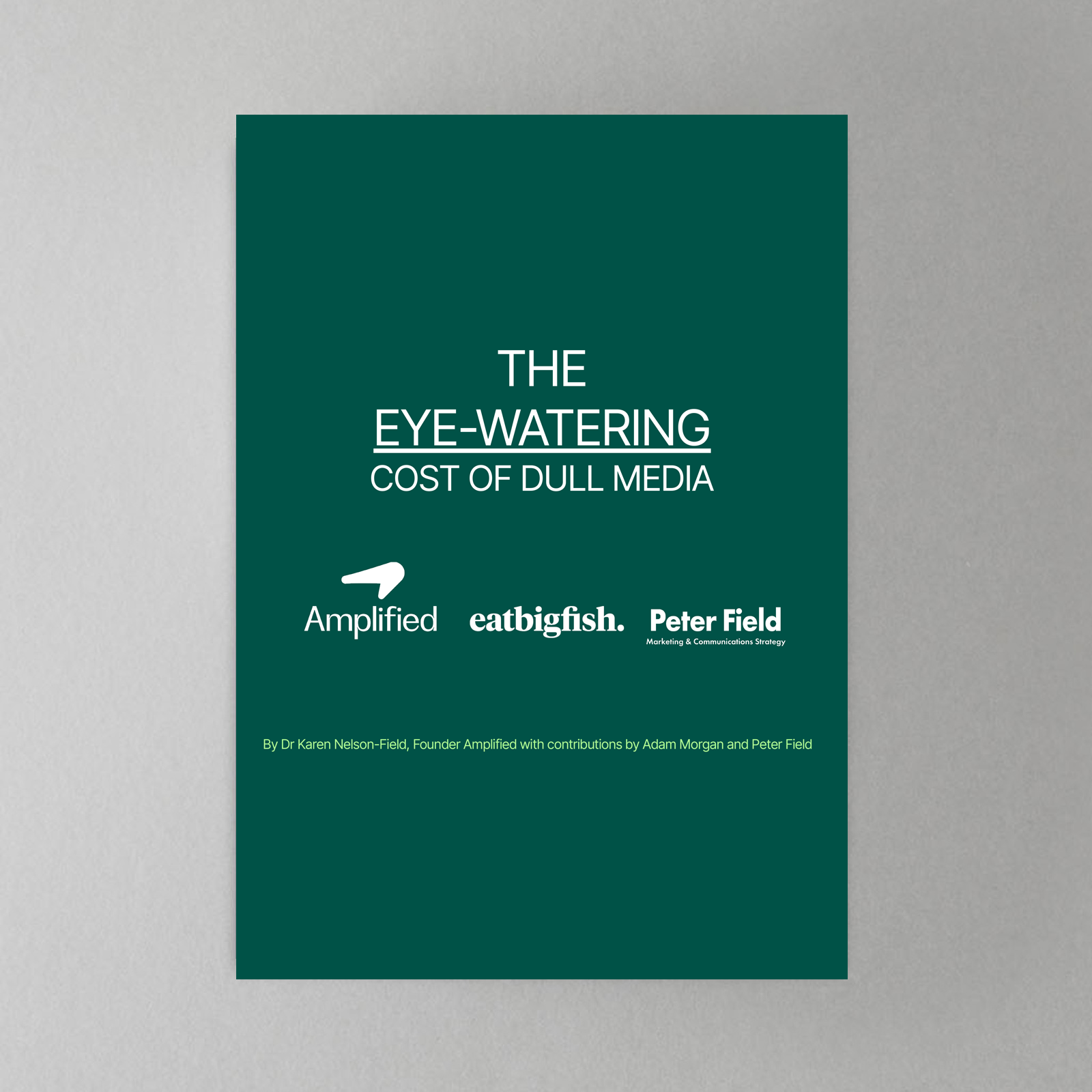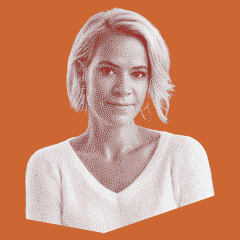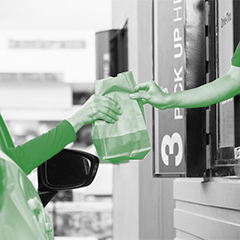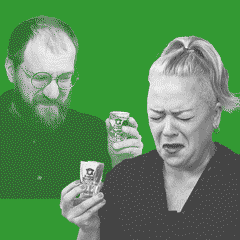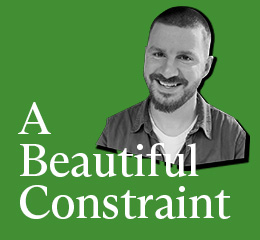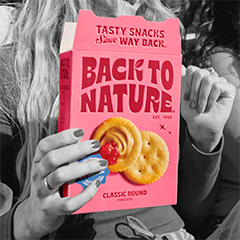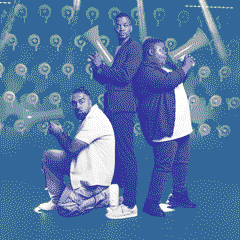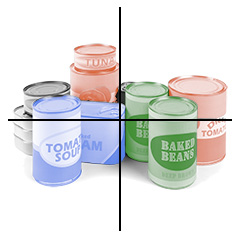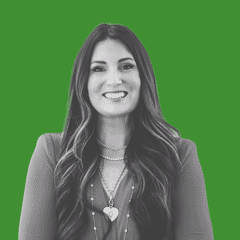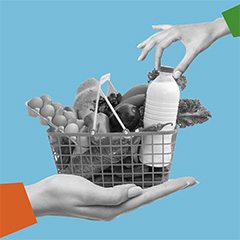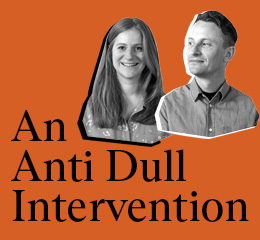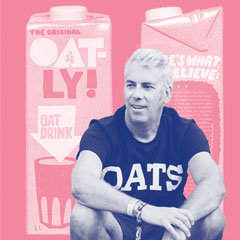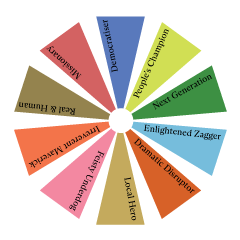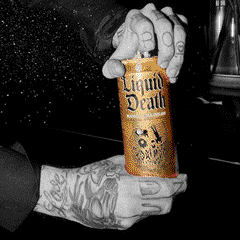Lettuce Financial: “The world of taxes needs a musical!”
Lettuce Financial: “The world of taxes needs a musical!”
When the public thinks taxes, they probably go to spreadsheets, accountants sitting in windowless rooms using a calculator and the IRS scaries. What may not spring immediately to mind? An AI-generated woman with lettuce for hair. But that’s the joy that Lettuce Financial, a new tax and accounting start-up, brings to the world. We spoke to their head of marketing, Gabrielle Tenaglia, their head of brand and content marketing, Kim Fredkin and the two creative directors who made it all happen, Ronnie Allman and David Roth, to find out how taxes, Lettuceheads and musicals aligned to create a brand that’s anything but dull.
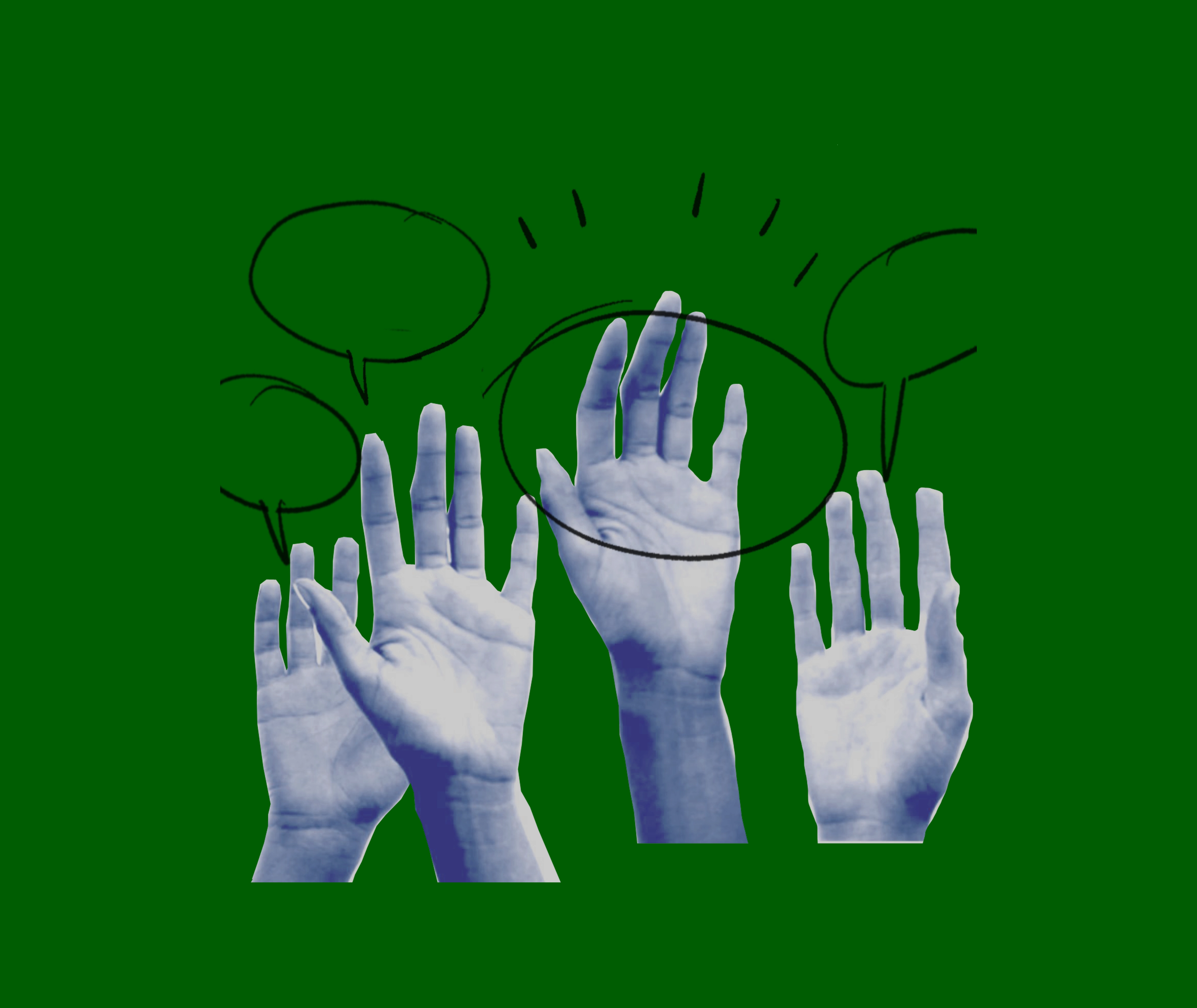


What does Lettuce exist to do?
Gabrielle Tenaglia: Lettuce automates taxes and accounting for businesses of one: Fractionals, freelancers, contractors. Anyone who runs a solo business. Every time a client or a customer pays them, we automatically calculate what they owe in federal and state taxes, set it aside, and pay it for them. Most importantly, we set them up with something called an S Corp, which is a tax status that can save them $10,000 or more. If you are a business-of-one it can be complex to manage an S Corp, so, traditionally, only companies with more employees took advantage of it. But because of technology, we're making it more accessible to this business-of-one audience.
We focus on this audience specifically, because almost everyone who works for themselves in the United States is overpaying their taxes today. The US tax system is really built to give all the advantages to W2 employees and corporations, but by being an S Corp, self-employed people can save thousands in the self-employment tax that they owe. The challenge is that S Corps are complex to run. It's bureaucratic. We automate all that with software.
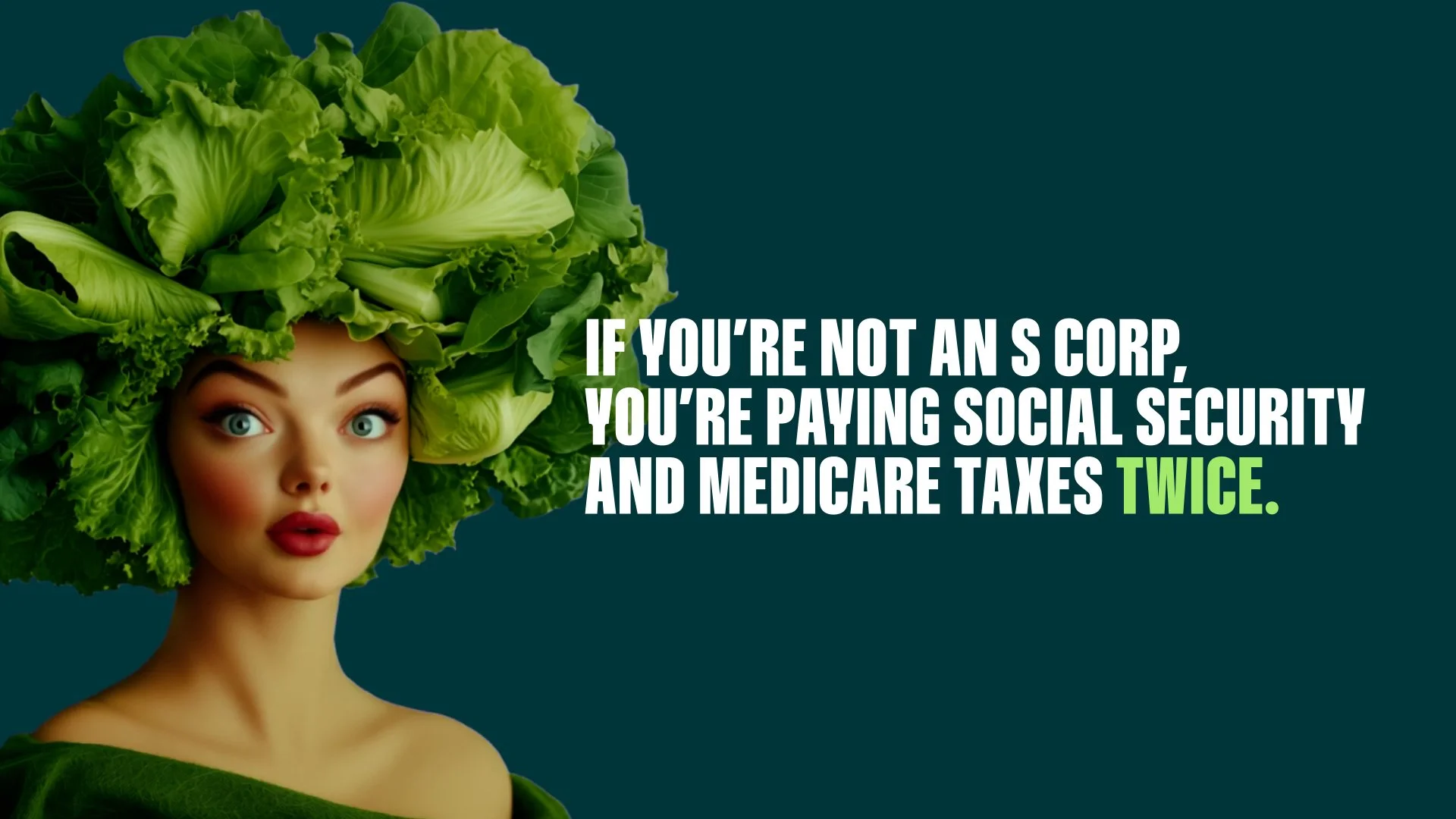
What is Lettuce challenging for that audience?
Gabrielle Tenaglia: The first thing is that taxes have to be hard and stressful. It's not true, and especially with technology, these things can be much easier. The second thing is that taxes have to be mysterious, and that you can never really know the right thing to do. There's a lot of people who are just overwhelmed by this. And the third thing we challenge is the culture out there around taxes that says 'if you just find the secret hack, you're going to save all the money.' This is not a secret hack. It's a legit way to save on taxes that the government developed, because they want small businesses to succeed. It's not a secret. It can be hard to do, but the secrets and hacks can actually get you in trouble. The tax category has this veneer of expertise that puts up all these barriers for people, and so they're either too intimidated to engage, and they avoid it, or it feels stressful. There's a knowledge and language barrier, but it doesn't have to be like that.
Given all these barriers, how are you getting people to engage?

Kim Fredkin: The biggest learning we’ve had is that if we're not pushing the envelope on both our message and our creative approach on how we're showing up, we are invisible. When you look at the data, we are just lost in the sea of bigger brands that do something similar to what we're doing. So whether it is with our Creator content or this innovative AI work that we're doing, we have to have some mechanism to grab attention, because either the creative is so quirky and interesting or the delivery is a little bit over the top. Where we're seeing the best results is when we really work to stand out. That’s the number one thing that's guiding a lot of the decisions we're making moving forward.
We really can't play it safe in this category, at the size we are and with the budgets that we have. The really ambitious goals are set at the CEO and executive level, but from a marketing perspective, it requires big swings to do it. And that includes both the creative and the media, where we're putting significant investments around some of this.
In a very traditional (and some might say dull) category like taxes, where did the idea for the creative come from?
Gabrielle Tenaglia: I wrote a brief that basically said, 'Make taxes more interesting.' And it came out of the [Cost of Dull] work. It was June, no one wanted to talk about taxes. So, we knew we needed to do something that was different to get people's attention.
Ronnie Allman: A lot of how we work is purely out of curiosity for the category. What do we not know? What do we know? Can those two worlds collide? What is the perception of the audience and what they may not know, and then always trying to find a nugget of humour in there to make it human. What are we selling? What are we trying to do? What does our audience want from us and then how can we make them smile at the end of the day?
David Roth: I don't think there are dull categories. I think there are dull people. If you were to talk to someone about, 'oh, we just won a big insurance client in the early 90s.' That doesn't sound exciting, right? But what is probably the most creative, fun category right now, at least in TV advertising — it's all the insurance brands. They're one of the few places for visual spectacle. They're all extremely memorable. They're all pushing each other to be funny. And it's become a comedy writer category and has turned some agencies into professional comedy agencies using professional comedians…if you treat it like it's a dull category, then you might come up with dull work.
In terms of Lettuce, one of the things was that when you're an early brand that no one knows about, it's just about name recognition. You have to hit that home a little bit more than if you're trying to really get into the weeds of certain benefits. Obviously, we need to talk about certain things like S Corp but in terms of specific executions, it’s just getting people to remember the name first so that’s why we use all the vegetable puns in the song.
Ronnie Allman: Sometimes we just have to be straightforward and talk about the brand the way it needs to be talked about, without this huge creative bubble around it. But the Lettuceheads let us do some of that heavy lifting to engage people, and that's always when it's fun and exciting to me because we can talk about something super boring and straight like we have to sometimes, but then with that extra layer on top, it makes it funny and new every time.
How did it come to be so musical?
Ronnie Allman: Early on, when Lettuce reached out, one of the first things they said was that they would love to make a musical – eventually.
Gabrielle Tenaglia: As soon as I started working on Lettuce, I just thought, 'oh, the world of taxes needs a musical.' But I never imagined that we could really do this, at least in the near term, because producing something like that is complex and expensive. It would make zero sense. So, the first thing that we made at Lettuce was an explainer video. We launched during tax season, and you get the natural traffic because people are thinking about taxes. But after April 15th, no one really wanted to think about taxes – it became harder and harder for us to get traction and traffic. We tried other things but they just weren’t working. Just by chance, right around that time, I saw David and his partner Ronnie posting some stuff on LinkedIn just playing around with AI — like, a musical with a yeti singing about YETI. So, I wrote them a note.
Ronnie Allman: We were like, well, why don't we just make [a musical] right now? I was already playing with a lot of AI tools like Suno where you type in lyrics, and within 20 seconds, you have two or three songs so you can test if it's going to be good, but then the AI part of the visuals came a little bit later. We knew we could get the music to do it, and we knew we could write the script to make the music funny. But then pairing that with visuals, I think it just came naturally with, oh, it's Lettuce. There's a lettuce head. If someone's singing, I guess it should be a woman with a lettuce head singing. It wasn't that big of a creative leap. It was just sitting right there. We knew we had to play with it, and we knew it would be a sing along because there are things that you have to do on Meta like put subtitles at the bottom. So, it's a musical, so those are your subtitles. So, let's make it a little sing along.
When people think taxes, they don’t generally think funny or silly. How did you know this was the right strategy to try out?
Gabrielle Tenaglia: Look, we have a piece of content that we're still using that’s the straight version of this, essentially. It was not made with AI, it was shot practically. It has some humorous moments, but it's a product explainer – it has screenshots and all the expected things. It was doing some work for us, but not enough.
The definition of crazy is doing the same thing and expecting different results – we could have done more straight stuff, but it didn't feel like to me that if we just tweaked the person, or we tweaked the line about S Corps, that that would make a difference. We needed to take a bigger step.
But I want to be really clear about this, and this is what I think is important for other brands who are trying to be more interesting to understand – using AI enabled us to do this piece. We never would have picked this out of the work that was presented if I had to choose just one [idea to move forward with]. We were in a seed stage at the time with some early customers. I could not have gone to my CEO in any reasonable way and said, 'We should make this musical. This is what we should be spending our marketing dollars on.' It wouldn't have happened. But being able to do it this way with AI gave us so much more room for experimentation – and the lesson and the value we got from that experimentation is huge.
David Roth: One of the interesting things about the brief was that Gabrielle and Kim really wanted a range of ideas and executions. So, we would think of something and then do the opposite or just choose something because it was so different from the last thing that we had done. The fact that they're doing all the data testing and figuring out what's effective and just letting us even do something that is outside of our own taste – it's great, because it’s all for research. It's all for data. It's all to learn. So, it doesn’t have to be my favourite. Some of the most effective things aren't necessarily your favourite. It's interesting just to learn, or just do something for the sake of 'let's just get it out there,' because with AI it costs basically nothing.
It's all exciting. As a creative, normally you're like, 'Oh, this got made because this person believed in it, and this thing didn't get made.' With this, everything gets made. Gabrielle talked to the CEO Ran Harpaz and he said, 'Let's make all of it' – and then we did make all of it. That's never happened to me before.
Kim Fredkin: Most places say they want you to take risks and learn, but it's really within a very narrow set of parameters of the brand as they think they know it – there's not a lot of room to push. I think it's the opposite here at Lettuce: the mentality here is really one of test and learn. Of course, everything that we do needs to be grounded in how we think it's going to drive the business, but there really is a focus on 'Let's put it in market, and let's let the customer tell us.'
Gabrielle Tenaglia: Ran, our CEO, really deserves so much credit for creating a culture where experimentation and learning are a top priority. He has really prioritised the strategy of: launch it, get it out there, learn something and then go make it better. He would rather try something and learn that it doesn't work than spend time and money crafting and making it perfect and then launching only to find out it doesn't work. And I think, he's learned that from experience. We were talking about some choices we had around media, and he told the team, 'I see that you're telling me I could get x incremental business if I spent this money. I would rather you come back to me with an idea about how we could 3x or 4x what we're doing in this specific place, and try it and fail, than for us to conservatively try and do this incremental thing that we're pretty sure we could do.' And I don't think we could do this without that baseline cultural expectation.



Do you think this process is replicable at other companies or for other campaigns? What’s your advice for other brands who want to use AI to get to more interesting work?
Ronnie Allman: Is it replicable? Yes, but I think that since this is such a new creative process, being open minded from the very start is how you end up with work like this. If you're at other big agencies and legacy agencies, they have a whole process, and they like to do things the way they've been doing them. And that gets in the way a lot of times. I love working with other artists, musicians and sound houses too, but you don't need that all the time. And David and I are artists too – what I do in creating these and what he writes in these songs, that's art to us. We're really putting our artistic values into this work. We try to make it the best we can with the tools that are emerging every single day.
David Roth: What used to happen was an agency cloistering up and working for two months on something and then presenting this banquet of work, and then getting feedback, and then taking two weeks to get more feedback, and then two more months to come back. Now it’s 'Get in the room with us.' We got nothing to hide – open kimono, as they say. We're happy to brainstorm – it's fun to brainstorm with Gabrielle and Kim and Ronnie all in one room. Just get it done.
And that stuff is so much more fun when it's quick, when everyone feels involved. When you're part of the process, where we're not hiding. We're not trying to say 'This only took 10 minutes, so it's not valuable.' It's more like, it took 10 minutes because Ronnie spent two years learning 17 programs. So, as long as everyone respects and appreciates that, then we're good.
Gabrielle Tenaglia: I've posted this work in a couple of marketing communities that I'm in, and other CMOs or people who have more business-side (or not creative) roles will say, 'Wow! Teach me how to do that.' And I'm very clear with them: I can't do this. If I were the one doing this, these ads would be bad. The reason why this is any good at all is because I have a really talented creative team who know how to make ads doing this work with AI. Maybe someday someone like me, without any great creative ideas, will be able to execute something like this. But right now, the value comes from the skillset that these guys have as creatives and artists being applied here.
I think the backlash is inevitable, but I don't think we're going back. Marketing budgets are not getting bigger. It's not going to get easier to figure out what works. You can do boring stuff, or you can figure out how to do more interesting stuff, and this is the path.
What does Lettuce exist to do?
Gabrielle Tenaglia: Lettuce automates taxes and accounting for businesses of one: Fractionals, freelancers, contractors. Anyone who runs a solo business. Every time a client or a customer pays them, we automatically calculate what they owe in federal and state taxes, set it aside, and pay it for them. Most importantly, we set them up with something called an S Corp, which is a tax status that can save them $10,000 or more. If you are a business-of-one it can be complex to manage an S Corp, so, traditionally, only companies with more employees took advantage of it. But because of technology, we're making it more accessible to this business-of-one audience.
We focus on this audience specifically, because almost everyone who works for themselves in the United States is overpaying their taxes today. The US tax system is really built to give all the advantages to W2 employees and corporations, but by being an S Corp, self-employed people can save thousands in the self-employment tax that they owe. The challenge is that S Corps are complex to run. It's bureaucratic. We automate all that with software.

What is Lettuce challenging for that audience?
Gabrielle Tenaglia: The first thing is that taxes have to be hard and stressful. It's not true, and especially with technology, these things can be much easier. The second thing is that taxes have to be mysterious, and that you can never really know the right thing to do. There's a lot of people who are just overwhelmed by this. And the third thing we challenge is the culture out there around taxes that says 'if you just find the secret hack, you're going to save all the money.' This is not a secret hack. It's a legit way to save on taxes that the government developed, because they want small businesses to succeed. It's not a secret. It can be hard to do, but the secrets and hacks can actually get you in trouble. The tax category has this veneer of expertise that puts up all these barriers for people, and so they're either too intimidated to engage, and they avoid it, or it feels stressful. There's a knowledge and language barrier, but it doesn't have to be like that.
Given all these barriers, how are you getting people to engage?

Kim Fredkin: The biggest learning we’ve had is that if we're not pushing the envelope on both our message and our creative approach on how we're showing up, we are invisible. When you look at the data, we are just lost in the sea of bigger brands that do something similar to what we're doing. So whether it is with our Creator content or this innovative AI work that we're doing, we have to have some mechanism to grab attention, because either the creative is so quirky and interesting or the delivery is a little bit over the top. Where we're seeing the best results is when we really work to stand out. That’s the number one thing that's guiding a lot of the decisions we're making moving forward.
We really can't play it safe in this category, at the size we are and with the budgets that we have. The really ambitious goals are set at the CEO and executive level, but from a marketing perspective, it requires big swings to do it. And that includes both the creative and the media, where we're putting significant investments around some of this.
In a very traditional (and some might say dull) category like taxes, where did the idea for the creative come from?
Gabrielle Tenaglia: I wrote a brief that basically said, 'Make taxes more interesting.' And it came out of the [Cost of Dull] work. It was June, no one wanted to talk about taxes. So, we knew we needed to do something that was different to get people's attention.
Ronnie Allman: A lot of how we work is purely out of curiosity for the category. What do we not know? What do we know? Can those two worlds collide? What is the perception of the audience and what they may not know, and then always trying to find a nugget of humour in there to make it human. What are we selling? What are we trying to do? What does our audience want from us and then how can we make them smile at the end of the day?
David Roth: I don't think there are dull categories. I think there are dull people. If you were to talk to someone about, 'oh, we just won a big insurance client in the early 90s.' That doesn't sound exciting, right? But what is probably the most creative, fun category right now, at least in TV advertising — it's all the insurance brands. They're one of the few places for visual spectacle. They're all extremely memorable. They're all pushing each other to be funny. And it's become a comedy writer category and has turned some agencies into professional comedy agencies using professional comedians…if you treat it like it's a dull category, then you might come up with dull work.
In terms of Lettuce, one of the things was that when you're an early brand that no one knows about, it's just about name recognition. You have to hit that home a little bit more than if you're trying to really get into the weeds of certain benefits. Obviously, we need to talk about certain things like S Corp but in terms of specific executions, it’s just getting people to remember the name first so that’s why we use all the vegetable puns in the song.
Ronnie Allman: Sometimes we just have to be straightforward and talk about the brand the way it needs to be talked about, without this huge creative bubble around it. But the Lettuceheads let us do some of that heavy lifting to engage people, and that's always when it's fun and exciting to me because we can talk about something super boring and straight like we have to sometimes, but then with that extra layer on top, it makes it funny and new every time.
How did it come to be so musical?
Ronnie Allman: Early on, when Lettuce reached out, one of the first things they said was that they would love to make a musical – eventually.
Gabrielle Tenaglia: As soon as I started working on Lettuce, I just thought, 'oh, the world of taxes needs a musical.' But I never imagined that we could really do this, at least in the near term, because producing something like that is complex and expensive. It would make zero sense. So, the first thing that we made at Lettuce was an explainer video. We launched during tax season, and you get the natural traffic because people are thinking about taxes. But after April 15th, no one really wanted to think about taxes – it became harder and harder for us to get traction and traffic. We tried other things but they just weren’t working. Just by chance, right around that time, I saw David and his partner Ronnie posting some stuff on LinkedIn just playing around with AI — like, a musical with a yeti singing about YETI. So, I wrote them a note.
Ronnie Allman: We were like, well, why don't we just make [a musical] right now? I was already playing with a lot of AI tools like Suno where you type in lyrics, and within 20 seconds, you have two or three songs so you can test if it's going to be good, but then the AI part of the visuals came a little bit later. We knew we could get the music to do it, and we knew we could write the script to make the music funny. But then pairing that with visuals, I think it just came naturally with, oh, it's Lettuce. There's a lettuce head. If someone's singing, I guess it should be a woman with a lettuce head singing. It wasn't that big of a creative leap. It was just sitting right there. We knew we had to play with it, and we knew it would be a sing along because there are things that you have to do on Meta like put subtitles at the bottom. So, it's a musical, so those are your subtitles. So, let's make it a little sing along.
When people think taxes, they don’t generally think funny or silly. How did you know this was the right strategy to try out?
Gabrielle Tenaglia: Look, we have a piece of content that we're still using that’s the straight version of this, essentially. It was not made with AI, it was shot practically. It has some humorous moments, but it's a product explainer – it has screenshots and all the expected things. It was doing some work for us, but not enough.
The definition of crazy is doing the same thing and expecting different results – we could have done more straight stuff, but it didn't feel like to me that if we just tweaked the person, or we tweaked the line about S Corps, that that would make a difference. We needed to take a bigger step.
But I want to be really clear about this, and this is what I think is important for other brands who are trying to be more interesting to understand – using AI enabled us to do this piece. We never would have picked this out of the work that was presented if I had to choose just one [idea to move forward with]. We were in a seed stage at the time with some early customers. I could not have gone to my CEO in any reasonable way and said, 'We should make this musical. This is what we should be spending our marketing dollars on.' It wouldn't have happened. But being able to do it this way with AI gave us so much more room for experimentation – and the lesson and the value we got from that experimentation is huge.
David Roth: One of the interesting things about the brief was that Gabrielle and Kim really wanted a range of ideas and executions. So, we would think of something and then do the opposite or just choose something because it was so different from the last thing that we had done. The fact that they're doing all the data testing and figuring out what's effective and just letting us even do something that is outside of our own taste – it's great, because it’s all for research. It's all for data. It's all to learn. So, it doesn’t have to be my favourite. Some of the most effective things aren't necessarily your favourite. It's interesting just to learn, or just do something for the sake of 'let's just get it out there,' because with AI it costs basically nothing.
It's all exciting. As a creative, normally you're like, 'Oh, this got made because this person believed in it, and this thing didn't get made.' With this, everything gets made. Gabrielle talked to the CEO Ran Harpaz and he said, 'Let's make all of it' – and then we did make all of it. That's never happened to me before.
Kim Fredkin: Most places say they want you to take risks and learn, but it's really within a very narrow set of parameters of the brand as they think they know it – there's not a lot of room to push. I think it's the opposite here at Lettuce: the mentality here is really one of test and learn. Of course, everything that we do needs to be grounded in how we think it's going to drive the business, but there really is a focus on 'Let's put it in market, and let's let the customer tell us.'
Gabrielle Tenaglia: Ran, our CEO, really deserves so much credit for creating a culture where experimentation and learning are a top priority. He has really prioritised the strategy of: launch it, get it out there, learn something and then go make it better. He would rather try something and learn that it doesn't work than spend time and money crafting and making it perfect and then launching only to find out it doesn't work. And I think, he's learned that from experience. We were talking about some choices we had around media, and he told the team, 'I see that you're telling me I could get x incremental business if I spent this money. I would rather you come back to me with an idea about how we could 3x or 4x what we're doing in this specific place, and try it and fail, than for us to conservatively try and do this incremental thing that we're pretty sure we could do.' And I don't think we could do this without that baseline cultural expectation.



Do you think this process is replicable at other companies or for other campaigns? What’s your advice for other brands who want to use AI to get to more interesting work?
Ronnie Allman: Is it replicable? Yes, but I think that since this is such a new creative process, being open minded from the very start is how you end up with work like this. If you're at other big agencies and legacy agencies, they have a whole process, and they like to do things the way they've been doing them. And that gets in the way a lot of times. I love working with other artists, musicians and sound houses too, but you don't need that all the time. And David and I are artists too – what I do in creating these and what he writes in these songs, that's art to us. We're really putting our artistic values into this work. We try to make it the best we can with the tools that are emerging every single day.
David Roth: What used to happen was an agency cloistering up and working for two months on something and then presenting this banquet of work, and then getting feedback, and then taking two weeks to get more feedback, and then two more months to come back. Now it’s 'Get in the room with us.' We got nothing to hide – open kimono, as they say. We're happy to brainstorm – it's fun to brainstorm with Gabrielle and Kim and Ronnie all in one room. Just get it done.
And that stuff is so much more fun when it's quick, when everyone feels involved. When you're part of the process, where we're not hiding. We're not trying to say 'This only took 10 minutes, so it's not valuable.' It's more like, it took 10 minutes because Ronnie spent two years learning 17 programs. So, as long as everyone respects and appreciates that, then we're good.
Gabrielle Tenaglia: I've posted this work in a couple of marketing communities that I'm in, and other CMOs or people who have more business-side (or not creative) roles will say, 'Wow! Teach me how to do that.' And I'm very clear with them: I can't do this. If I were the one doing this, these ads would be bad. The reason why this is any good at all is because I have a really talented creative team who know how to make ads doing this work with AI. Maybe someday someone like me, without any great creative ideas, will be able to execute something like this. But right now, the value comes from the skillset that these guys have as creatives and artists being applied here.
I think the backlash is inevitable, but I don't think we're going back. Marketing budgets are not getting bigger. It's not going to get easier to figure out what works. You can do boring stuff, or you can figure out how to do more interesting stuff, and this is the path.
Putting the joy back into work (with Bruce Daisley)
If work takes up so much of our lives, and so much of work’s output is down to discretionary effort, how do we make work more engaging - as leaders of teams, and as workers ourselves?
Bruce Daisley has become a world expert on it. Previously the MD of YouTube in the UK, Bruce was the European Head of Twitter when he started exploring the meaning and future of work in a podcast, Eat Sleep Work Repeat. His first book, The Joy of Work, was a Sunday Times number one business bestseller and an FT Book of the Month. He is also the host of the hugely successful podcast ‘Eat Sleep Work Repeat’.
In this episode Adam and Bruce first discuss how to get rid of the things that suck the joy out of work, and then how to create a positive buzz in our engagement, as an individual and as a team.
They talk about:
- What the really big disruption in work has been (and it’s not wfh)
- The essential foundations for making any impact whatsoever on engagement in a culture
- The two key indicators of real engagement at work
- Why idle time is so important
- The real enemy of productivity in an organisation
- The power of Positive Affect
- The surprising importance of laughter
And why, when so much is known about how to drive up engagement at work, so little of that knowledge makes it into the leadership meetings of big organisations.
Listen to Eat Sleep Work Repeat:
Apple: https://podcasts.apple.com/gb/podcast/eat-sleep-work-repeat/id1190000968
Spotify: https://open.spotify.com/show/5KUW5Lu36O4nnfIFqIIUh4
Bruce's books:
The Joy of Work: 30 Ways to Fix Your Work Culture and Fall in Love with Your Job
Fortitude: The Myth of Resilience, and the Secrets of Inner Strength
__
Follow Adam on Linkedin: https://www.linkedin.com/in/adam-morgan-3a473a/
Let's Make This More Interesting is a podcast from eatbigfish. Thanks to our editor Ruth, our producer Travis, and to Tiny Podcasts.
Lessons, Frameworks, Power and Sex (a look back at Season 1)
In this bonus episode Adam summarises the key themes and learnings across all the guests from the first season, to make it useful and usable for you.
He breaks his conclusions into five sections:
1. The Cost of Dull and the Value of Interesting
2. The Four Kinds of Dull
3. Finding the right way to be interesting for you
4. Common themes and key ideas across all the guests
5. How to use it
Read the full transcript of the episode at The Challenger Project.
---------
Connect with Adam on LinkedIn: https://www.linkedin.com/in/adam-morgan-3a473a/
Follow eatbigfish on Linkedin and Instagram
With thanks to our editor Ruth and producer Ross.
Leading the world towards hope (with Gail Gallie)
We’re at an inflection point in how we engage people about the UN’s Sustainable Development Goals, Gail Gallie believes: we now need a completely new model – ‘The gloves are off’. Gail left a successful career in advertising and at the BBC to help set up Project Everyone with campaigner and film director Richard Curtis – their aim: to communicate the UN’s Sustainable Development Goals to everyone in the world in one week. 10 years later, she remains a relentless campaigner and innovator around communicating the SDGs, including the podcast she hosts with Loyiso Madinga, ‘An Idiot’s Guide to Saving The World’.
In this week's episode, Gail and Adam discuss:
- How the combination of a big ambition and a fierce time constraint drove breakthrough solutions for Project Everyone
- The new context: how the whole world has changed, and we need to move on from the old model now
- What this new model of impact campaigning should look like
- The role of surprise here, and how to get the most value from it
- Why the creative campaigning community now has to go for broke
- What it means to engage people in the conversation where they care when it comes to the SDGs, and in language they can relate to
And, in Richard Curtis’ words ‘What is the sound of hope we can make against the noise of despair?’
__
Follow Adam on Linkedin: https://www.linkedin.com/in/adam-morgan-3a473a/
Let's Make This More Interesting is a podcast from eatbigfish. Thanks to our editor Ruth, our producer Travis, and to Tiny Podcasts.
Giving up the gold (with Nick Reed)
Named ‘one of the most 10 influential Brits in Hollywood’ by The Sunday Times, Nick Reed has been a successful Hollywood agent, won an Oscar for a documentary called ‘The Lady in Number 6’, and co-founded the most successful viral content company in the US.
In this episode, Nick discusses with Adam what makes something not just more interesting, but interesting enough to share – along with what it’s like to celebrate winning an Oscar with Bill Murray, how to get cast in a Steven Spielberg film, and how to get a Hollywood studio to buy a writer that nobody wants to buy. And at the heart of Nick’s philosophy is what he calls ‘giving up the gold’: giving value to the other person early, without expecting anything in return. A longer episode that ends this first season, we hope you enjoy it.
Nick's company - Shareability: https://www.shareability.com/
Follow Nick on Linkedin: https://www.linkedin.com/in/nick-reed-79269731/
Watch Nick's Oscar winning film, The Lady in No. 6, here: http://nickreedent.com/
---------
Connect with Adam on LinkedIn: https://www.linkedin.com/in/adam-morgan-3a473a/
Follow eatbigfish on Linkedin and Instagram
With thanks to our editor Ruth and producer Ross.
Interesting at the speed of culture (with Nick Tran)
Is TikTok the most interesting platform in the world? What’s at the heart of its success – and what does it mean to be more interesting in a post TikTok world, when the audience on TikTok is “10x bigger every day than the Super Bowl”?
In this week’s episode, Adam meets Nick Tran, former Global Head of Marketing at TikTok and advisor to a new generation of Challengers, including tech company Nothing. Nick brings his experience as a marketer, advisor and investor to discuss:
- How TikTok has changed the playing field for a new generation of brands
- How he led ‘Project Cheetah’ to reduce TikTok’s campaign development cycle from 10 weeks to a few days.
- The creativity that financial and time constraints force you to develop
- Why he always looks for win-win-win partnerships
- Learning how to create a ’must-see’ piece of creative work
- Why he believes in moving creative in-house to speed up social
- The need for a balanced diet of marketing measurement beyond KPIs and ROI
__
Connect with Nick on Linkedin: https://www.linkedin.com/in/nicholastran/
Follow Adam on Linkedin: https://www.linkedin.com/in/adam-morgan-3a473a/
Let's Make This More Interesting is a podcast from eatbigfish. Thanks to our editor Ruth, our producer Travis, and to Tiny Podcasts.
The third American art form (with Russell Davies)
Powerpoint has become the poster child of Dull – can even this most maligned of mediums really be a tool to be more interesting? Russell Davies not only believes it can, but that it’s the third American art form, along with jazz and hip hop – but only if we think of it and use it in a very different way. It seems such a symbolic flip for the cliché of ‘Death by Powerpoint’, that we’ve given it its own short episode. Here Russell shares his very simple rules for really engaging an audience through Powerpoint.
Russell's book: Do Interesting. Notice. Collect. Share.
https://thedobook.co/products/do-interesting-notice-collect-share
_______
Connect with Adam on LinkedIn: https://www.linkedin.com/in/adam-morgan-3a473a/
Follow eatbigfish on Linkedin and Instagram
With thanks to our editor Ruth and producer Ross.
Creating character at Dishoom (with Sara Stark)
For 10 years Sara Stark was part of the team helping the founders of Dishoom build their restaurant brand and business – a brand that is as rich, engaging and layered as so many other restaurants are superficial and glib.
It’s a conversation about stories, and curiosity, and inventiveness, and layering, and pushing the idea. About a continual commitment to exploring and digging and experimenting and keeping things fresh. About thinking about what it means to be different, genuinely different and engaging, in a way that seems entirely unlike the rest of the business.
If you are remotely interested in brand building, experience or culture the Dishoom story is an inspiration.
Connect with Sara on Linkedin https://www.linkedin.com/in/sara-stark-creative-marketing/
Explore the layers of the Dishoom story at https://www.dishoom.com/
__
Follow Adam on Linkedin: https://www.linkedin.com/in/adam-morgan-3a473a/
Let's Make This More Interesting is a podcast from eatbigfish. Thanks to our editor Ruth, our producer Travis, and to Tiny Podcasts.
Making the magic more probable (with Russell Davies)
One of the most stimulating speakers in brands and communications, Russell has been thinking about what it means to be interesting for over 20 years. In his new book Do Interesting – Notice. Collect. Share. Russell has codified the practice he’s used to make the world more interesting to him, and to make himself better positioned to bring interest to whatever topic he finds himself working on, inside and outside the world of brands. In this episode he shares how we can do it easily, too.
https://thedobook.co/products/do-interesting-notice-collect-share
_______
Connect with Adam on LinkedIn: https://www.linkedin.com/in/adam-morgan-3a473a/
Follow eatbigfish on Linkedin and Instagram
With thanks to our editor Ruth and producer Ross.
The question is more important than the answer (with Warren Berger)
Warren Berger began exploring how to ask better questions through a journalistic interest in innovation. He’s come to believe the importance of questions is much broader than that, and has come on to champion the development of better questioning skills in everything from education to our personal relationships.
He has written widely on the topic, including ‘A More Beautiful Question: The power of inquiry to spark breakthrough ideas’.
In a discussion of some of his central findings and ideas we talk about:
- Why the question can be more important than the answer
- What makes a question dull or interesting
- How a good question shifts things
- The power of ‘Questionstorming’
- How a good question ‘attracts’ answers
- His three part model to asking better questions
- Why businesses should think about having Mission Questions, rather than Mission Statements
And the power for all of us in having three big questions that guide our lives.
Find out about Warren's books on his website: https://warrenberger.com/warren-bergers-books/
__
Connect with Adam on Linkedin: https://www.linkedin.com/in/adam-morgan-3a473a/
Let's Make This More Interesting is a podcast from eatbigfish. Thanks to our editor Ruth, our producer Travis, and to Tiny Podcasts.
Lashing the world with story (with John Yorke)
While storytelling isn’t the automatic answer to every kind of ‘dull’, if we’re going to learn how to tell more interesting stories we should learn from the best. John Yorke founded the BBC Studio Writer’s Academy after a career that included being Head of Channel4 Drama and Controller of BBC Drama Production, working on and producing some of the world’s most widely viewed and critically acclaimed TV drama, from EastEnders to Shameless, Life on Mars and Wolf Hall. In this episode, he shares with Adam his learnings about how we can all tell a story that will really engage our audience.
Read John’s book: Into The Woods: How stories work and why we tell them
John’s company and training services: https://www.johnyorkestory.com/
_______
Connect with Adam on LinkedIn: https://www.linkedin.com/in/adam-morgan-3a473a/
Follow eatbigfish on Linkedin and Instagram
With thanks to our editor Ruth and producer Ross.
How to tell a big story in just 90 seconds (with Louisa Preston and Luisa Baldini)
How do you engage an audience in something that really matters in just 90 seconds? Where do you start? How do you overcome the ‘curse’ of everything you know?
In this episode Adam talks with two former BBC reporters, Louisa Preston and Luisa Baldini, about how they become experts in being compelling in 90 seconds, in careers where they covered everything from the 7/7 bombings and the Amanda Knox trials to interviewing Richard Gere on the red carpet. They now have their own business, Composure Media, that helps executives become brilliantly succinct themselves.
They discuss:
- Their model for engaging in 90 seconds: ‘Hook, Line, and Sinker’
- Why you should always start with your strongest ‘picture’
- Overcoming the curse of expertise
- The importance of the story that only you know
- How to manage a confidence crisis
- What to do when your Hollywood star goes rogue on live TV
And we close by discussing a big part of their work today: helping female executives develop a more confident elevator pitch and presence.
Find out about Louisa and Luisa's work here: https://www.composure.media/
___________
Connect with Adam on Linkedin: https://www.linkedin.com/in/adam-morgan-3a473a/
Let's Make This More Interesting is a podcast from eatbigfish. Thanks to our editor Ruth, our producer Travis, and to Tiny Podcasts.
The interesting Squiggle and the long ‘Aha’ (with Helen Tupper and Sarah Ellis)
The Squiggly Careers podcast has been hugely influential and useful for anyone interested in Career Development community. In this episode I talk to Sarah Ellis and Helen Tupper, the brilliant pair behind the podcast, the two bestselling books that have come out of it – Squiggly Careers and You Coach You – and the company they have founded, Amazing if.
We discuss:
- How, in looking to throw out the old model of the ‘career ladder’, they arrived at that fascinating idea and language of the ‘squiggle’
- How they’ve found a much more engaging way to talk to people about confidence issues, and why it works
- Why dullness in large organisations is often a kind of conformity
- How to be a ‘helpful rebel’ in big companies if you want to help shake up dull practices
Along the way, they talk about a fascinating idea: ‘the long aha’ – that realisation that comes to you sometime after an engaging moment in a meeting, prompting you to question something you are doing, when you realise how pervasive that practice and issue has been in your life. As fascinating and useful as you would expect from the inimitable Sarah and Helen.
Listen to the Squiggly Careers podcast
Find out more about Amazing If's work
Helen and Sarah's books:
________
Connect with Adam on LinkedIn: https://www.linkedin.com/in/adam-morgan-3a473a/
Follow eatbigfish on Linkedin and Instagram
With thanks to our editor Ruth and producer Ross.
The five components of interesting (with Jeffre Jackson and Dave Nottoli)
This week Adam talks to renowned planners David Nottoli and Jeffre Jackson about their research into ‘interestingness’ in advertising.
Drawing from their experience David and Jeffre share their definition of the five key components of interesting:
- How incongruity reinforces memory
- Why Don Draper might be wrong about emotions
- The significance of fish sticks
- Why authenticity isn’t just a buzzword
- Why the details really matter, even if 99% of people don’t notice them
We also learn why we should avoid chasing empty spectacle in the battle for attention, why Nike’s legendary work with athletes can’t be replicated by just any sports brand, what the classic Cadbury’s Gorilla ad teaches us about mystery, and the risk of being sucked into the ‘boreplex’.
Watch Jeffre’s 2006 video on Interestingness: how interesting ads work differently, and what value Interestingness delivers for marketers.
Nike x Charles Barkley “I am not a role model”
Nike x Tiger Woods "I Am Tiger Woods"
___________
Connect with Adam on Linkedin: https://www.linkedin.com/in/adam-morgan-3a473a/
Let's Make This More Interesting is a podcast from eatbigfish. Thanks to our editor Ruth, our producer Travis, and to Tiny Podcasts.
Two thousand years more interesting (with Professor Arlene Holmes-Henderson)
In this episode we talk to Professor Arlene Holmes-Henderson, Professor of Classics Education and Public Policy at Durham University, about her fierce belief in the enduring relevance of classical rhetoric to today’s world, and why its value in helping disadvantaged children find their voice in a more engaging way is fundamental to how schools need to develop oracy, alongside literacy and numeracy. And at the end, she gives a 10-minute masterclass in classical rhetoric that we can all use to make a speech more interesting.
_____________
Arlene's books Forward with Classics and Expanding Classics
The ‘Shy bairns get nowt’ project https://www.durham.ac.uk/news-events/latest-news/2023/05/shy-bairns-get-nowt/
Arlene's work in The Guardian https://www.theguardian.com/education/2023/jun/04/brucey-and-caesar-can-help-children-improve-oracy-says-classic-professor
Connect with Adam on LinkedIn: https://www.linkedin.com/in/adam-morgan-3a473a/
Follow eatbigfish on Linkedin and Instagram
With thanks to our editor Ruth and producer Ross.
Does our attention define us? (with Faris Yakob)
Faris Yakob believes that attention is not merely the first step to engagement with something, but a fundamental shaper of who we are: if ‘we are what we eat’, then what we pay attention to comes to define us.
The author of ‘Paid Attention’ and co-founder of Genius Steals, he and his wife Rosie have spent the last ten years as modern nomads, consulting, speaking and writing. In this episode Adam and Faris discuss:
- How Faris’ diverse career and nomadic life has been ‘a quest for interesting’
- Why attention is part of the substance of our existence
- Why it is impossible to buy attention today …
- …And yet everyone is still competing for our attention all the time
- Strategies for earning attention in a saturated media age
- Why the ‘most interestingness’ comes in the connection of domains that are not obviously connected
Follow Faris on Linkedin: https://www.linkedin.com/in/farisyakob/
Subscribe to Faris and Rosie's substack 'Strands of Genius': https://geniussteals.substack.com/
Connect with Adam on Linkedin: https://www.linkedin.com/in/adam-morgan-3a473a/
Let's Make This More Interesting is a podcast from eatbigfish. Thanks to our editor Ruth, our producer Travis, and to Tiny Podcasts.
How to win a peacock show (with Gemma Parkinson)
This is a podcast for people who can’t afford to bore their audience. And in this episode we talk to Gemma Parkinson, a Global Marketing and Business Director at Moet Hennessy, about how to elevate a presentation into an irresistible performance when you really need to carry an audience with you. A fresh, energetic and charismatic thinker, Gemma shares her advice about how to elevate the interest when it really matters.
____
Connect with Adam on LinkedIn: https://www.linkedin.com/in/adam-morgan-3a473a/
Follow eatbigfish on Linkedin and Instagram
With thanks to our editor Ruth and producer Ross.
A healthy dose of horror (with Mathias Clasen)
That’s enough about humour and the lighter side of interesting.
It’s time to step into the dark.
This week Adam meets researcher Mathias Clasen, co-founder of the ‘Recreational Fear Lab’ and author of Why Horror Seduces and A Very Nervous Person's Guide to Horror Movies, to talk about what he’s learned from haunted houses and horror movies, and how to find the ‘sweet spot’ of scary.
Adam and Mathias discuss:
- The definition of ‘recreational fear’, and why it’s not just for horror film fans
- The evidence that shows why fear is good for us. Why children need more ‘risky play’ for their development than we are giving them, and the surprising results of Mathias’ research into fear on our immune systems
- The physiological and cognitive relationship between fear and enjoyment
- Why we should all make friends with Mr Piggy
_
Read Mathias's books:
A Very Nervous Person's Guide to Horror Movies
Watch Mathias's TedX talk: Lessons from a terrified horror researcher
Connect with Adam on Linkedin: https://www.linkedin.com/in/adam-morgan-3a473a/
Let's Make This More Interesting is a podcast from eatbigfish. Thanks to our editor Ruth, our producer Travis, and to Tiny Podcasts.
On Saturn it’s raining diamonds (with Addison Brown)
How can we be interesting enough to stick in our audiences’ long-term memory? In this episode, Adam speaks to Addison Brown, the science teacher who was the star of a recent Department for Education recruitment film. They discuss the four key principles that underpin success in every lesson – from cognitive load to dual coding – and how shorter pupil attention spans and higher expectations have driven a ‘blossoming of imagination within teaching'.
'Every Lesson Shapes a Life': https://www.youtube.com/watch?v=aGd_Rrs-qNY
Brian Cox asks 'what more do you want?" https://www.youtube.com/watch?v=7uqa2TMzag4
_________
Connect with Adam on LinkedIn: https://www.linkedin.com/in/adam-morgan-3a473a/
Follow eatbigfish on Linkedin and Instagram
With thanks to our editor Ruth and producer Ross.
Stand up and make me laugh (with Chris Head)
Last week’s episode made the business case for humour - but how do we start to find our funny? This week Adam Morgan meets standup comedy writing and speaking coach Chris Head for a comedy masterclass.
Chris shares practical experience and techniques he uses when working with comedians, how he helped stand-up Stepfania Licari push her personal stories for the biggest payoff and coached Richard Lindesay to become a headliner (and TikTok star), all while punching up Adam’s jokes along the way,
They discuss:
- The power of comedy to help engage people with serious and challenging subjects
- Simple techniques to build humour and surprise into anything from a story to an internal announcement
- The importance of making an immediate connection with the audience to break the tension
- The craft involved to go from a joke-shaped thought into a bigger, funnier routine
- The power of misdirection (but not the magic kind)
_____
Contact Chris (or sign up to a course): https://www.chrishead.com/
Chris’s books:
Creating Comedy Narratives for Stage and Screen
A Director's Guide to the Art of Stand-up
The Complete Comedy Script Toolkit
_____
Connect with Adam on Linkedin: https://www.linkedin.com/in/adam-morgan-3a473a/
Let's Make This More Interesting is a podcast from eatbigfish. Thanks to our editor Ruth, our producer Travis, and to Tiny Podcasts.
The secret of Elmo’s success (with Norman Stiles)
In this episode, Adam talks with Norman Stiles, for 20 years the Head Writer on Sesame Street, about the pioneering pairing of entertainers and educators that changed the educational life of a generation. And how success lay in a very simple ambition that has fascinating implications for us all. Sesame Street made something possible that people thought couldn’t be done. What can it teach us about the audiences we want to really engage?
Watch the classic Sesame Street scenes that Norman refers to during the conversation:
- Grover really wants us to learn near and far
- Ernie answers the Count's telephone
- Telly tries to help Elmo get over his fear of clowns
- Big Bird learns about 'just because' and says goodbye to Mr Hooper
----
Connect with Adam on LinkedIn: https://www.linkedin.com/in/adam-morgan-3a473a/
Follow eatbigfish on Linkedin and Instagram
With thanks to our editor Ruth and producer Ross.
The commercial case for humour (with Bridget Angear)
Is our business leaving money on the table by being too serious? In this episode, Adam speaks to Bridget Angear, legendary strategic planner and co-founder of Craig + Bridget, about her recent research “The Business Case for Humour in Advertising”.
Adam and Bridget explore the evidence for the business effects of humour as revealed in the IPA database, and the different values that different types of humour can have for us if we’re looking to be more engaging.
They look at why marketing and communications might be less entertaining now than it used to be, and they consider why agencies and clients seriously need to have a bit more fun.
Because, despite the business case for humour, have we all become just too scared to be funny?
--
Connect with Adam on Linkedin: https://www.linkedin.com/in/adam-morgan-3a473a/
Watch Bridget deliver “The Business Case for Humour in Advertising” here: http://youtube.com/watch?v=r91B08Xebtg
Bridget's books -
- The insiders' guide to advertising: How the business of advertising really works
- Creative problem solving.: A useful little strategy book by craig+bridget
- Revolt: A movement owner's manual
--
Let's Make This More Interesting is a podcast from eatbigfish. Thanks to our editor Ruth, our producer Travis, and to Tiny Podcasts.
Who Are You Really? (with Ross Buchanan)
In this episode, Adam talks to national radio presenter Ross Buchanan (Absolute Radio, Radio X) about what it takes to be interesting for four hours with an audience you never actually see. How much is it about being more interesting in what you say and do, and how much is it about what you share of yourself? And why shouldn’t you talk about biscuits?
-
Connect with Adam on LinkedIn: https://www.linkedin.com/in/adam-morgan-3a473a/
Follow eatbigfish on Linkedin and Instagram
With thanks to our editor Ruth and producer Ross.
Break that routine (with Simon Peacock)
This week Adam meets award-winning improviser and director of the iconic Assassin’s Creed video games Simon Peacock to explore how the element of surprise makes his work and life more interesting.
Beginning with Simon’s early success as a professional improviser in Montreal, they discuss the 10 commandments of good improvisation, why routine and repetition ruin a performance, and what happens when you apply improv principles to your own wedding.
In the second half, Simon shares what it takes to give a more interesting audition, his experience as a director in the world of video games, and why audiences crave surprise.
We find out what preparation it takes to direct 2,000 lines of dialogue in one day, why it’s always a good idea to deliver a unique take in an audition (even if it doesn’t land you the job), and the terrible fate of a canvas sack called Bob.
__
Connect with Adam on Linkedin: https://www.linkedin.com/in/adam-morgan-3a473a/
Let's Make This More Interesting is a podcast from eatbigfish. Thanks to our editor Ruth and our producers at Tiny Podcasts.
Why Your Dog is a Better Producer Than You (with Maz Farrelly)
In this episode, Adam speaks to reality TV producer Maz Farrelly. Maz has made some of the biggest shows on 3 continents, including Britain’s Got Talent, Dancing with the Stars, Big Brother and Celebrity Apprentice – interviewing 12,000 hopefuls along the way. She now works with businesses to help them make themselves more interesting.
Maz shares her learnings on what it takes to really engage an audience, the three secrets of great content, and how to be interesting enough to get cast in one of her shows. Along the way, we discuss:
- Why, if you’re ambitious, you have to see everything as a ‘production’
- How your dog produces you to get what it wants
- What ‘white noise’ is, and why it matters
- How to interview well enough to get into the Big Brother house
- Why many of us have become lazy producers, particularly in big companies
- When ‘fine’ isn’t good enough if you want to be the Number 1 Show
- Asking the questions to discover the interesting story in everyone (and how to make a dull person interesting for a TV audience)
- Why you can only last for a week before you ‘leak’
- The power of subverting expectations as a producer
- The recipe for great content on television (and how to play Susan Boyle Bingo)
- The importance of really ‘scratching’ to get to what’s interesting
- Three bits of advice on how to be a great producer and be more interesting
- How to apply this to our business and personal life
Maz is as fascinating as she is funny. We hope you enjoy this wonderfully stimulating conversation with someone who makes everything she does a little more interesting.
__
Find out about Maz's work here: https://www.mazspeaks.com/
Follow Maz on Linkedin: https://www.linkedin.com/in/maz-speaks/
Connect with Adam on LinkedIn: https://www.linkedin.com/in/adam-morgan-3a473a/
Follow eatbigfish on Linkedin and Instagram
With thanks to our editor Ruth and producer Ross.
Why you need a third Spider Drop (with Heather McGill)
In this episode Adam talks to Heather McGill, Head of Spectator Experience at London 2012 and previously Tour Manager for the Spice Girls, about how to create more interesting shared experiences.
Heather shares lessons about how to create more engaging spectator experiences for live tours and ‘global mega events’ such as the Olympics and Paralympics, large industry expos like Dubai 2020, and her current project, the Harry Potter Forbidden Forest, which has sold over a million tickets.
In a wide-ranging conversation that spans her career Heather reveals insights on:
- The real competition when you are designing experiences
- How to structure the development of an experience
- The importance of the lull, as well as the high
- What exponentially changing audience expectations really means for being more interesting in experience today
- Sir Jonny Ive’s one piece of advice on designing the London 2012 experience
- The three ways to tackle a problem in the experience
- The value of creating common ownership
- How constraints make the experience better
- How to build wonder
…Oh, and why the third spider drop makes all the difference.
___
Find out more about Heather’s work: https://www.unifyexp.com/
The Harry Potter Forbidden Forest Exerience: https://hpforbiddenforestexperience.com/
Connect with Adam on Linkedin: https://www.linkedin.com/in/adam-morgan-3a473a/
Follow eatbigfish on Linkedin and Instagram
The Cost of Dull in Business (with Peter Field)
In this opening episode, Adam discusses a new analysis that reveals the real financial cost to a business of being dull with Marketing Effectiveness expert Peter Field. Exactly how much more expensive is it to run dull communications than engaging ones? And what can we learn from people who can’t afford to bore their audiences?
Adam and Peter's conversation explores:
- Why we should be much more intolerant of dull external and internal communication than we are
- A simple test: ‘The six slide rule’
- How we can make dull itself more interesting to those we need to change - by putting a concrete cost on it
- Peter’s new analysis, and what it reveals
- So why is it that so many well-intentioned, smart people are choosing to be dull?
- A look ahead to the future guests on the podcast: people whose job it is to make dull subjects interesting, and the two kinds of things we’ll learn from them
- 3 things you can do tomorrow
__
Download Peter's slides on The Cost of Dull here: https://thechallengerproject.com/blog/the-cost-of-dull-with-peter-field
Follow Peter's work here: https://www.linkedin.com/in/peter-field-20110120/
Connect with Adam on LinkedIn: https://www.linkedin.com/in/adam-morgan-3a473a/
Follow eatbigfish on Linkedin and Instagram
With thanks to our editor Ruth and producer Ross.
When Kerosene met Dull (with Peter Field)
A year into the project, what have we learnt about the real price of being dull? Adam opens Season 2 with one of the core collaborators on The Extraordinary Cost of Dull, marketing effectiveness expert Peter Field.
Peter and Adam share how the Extraordinary Cost of Dull has grown from an idea that kickstarted our last season to a 3-year research project with multiple contributors. One that has been sparking a vital conversation within the marketing and communications community over the last year.
Starting with their reflections on the response to the project so far, they discuss new developments including:
Data from the DMA that reveals what dull is costing us not just in TV, but through the whole funnel
Upcoming work from Dr Karen Nelson-Field, another core collaborator, on the real cost of choosing lower attention media platforms and channels
Peter’s latest findings on the business effects of dull, and its impact on brand trust
The development of the practical strategic tools to help marketers avoid dull from the start
They finish with a look at their ambitions for The Extraordinary Cost of Dull in the year head.
____
The Extraordinary Cost of Dull Project is open to contributors. Do you have a data set to share with the project? Get in touch at hello@eatbigfish.com
Follow Peter's work here: https://www.linkedin.com/in/peter-field-20110120/
Connect with Adam on Linkedin: https://www.linkedin.com/in/adam-morgan-3a473a/
Follow eatbigfish on Linkedin and Instagram
Trailer: Let's Make This More Interesting
Do you have moments in your business or personal life when you simply can’t afford to bore your audience? What can we do to hold their undivided attention when it really matters? To find out, Adam Morgan, founder of eatbigfish, speaks to fascinating people who excel at engaging their audience – be they distracted social scrollers, bored schoolchildren or cynical CEOs – and learns from them how we can all be much more interesting.
No one’s ever won the race by keeping pace
Explore more on this topic
Challenge my thinking
